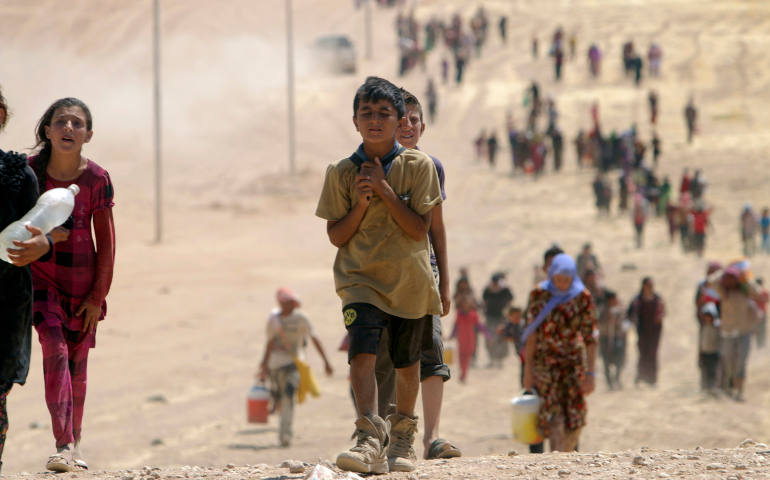
Children flee violence from forces loyal to the Islamic State in Sinjar, Iraq, Aug. 10. Islamic State militants have killed at least 500 Yezidi ethnic minorities, an Iraqi human rights minister said. (CNS photo/Rodi Said, Reuters)
The heart-wrenching tragedies throughout the Middle East are not the United States' fault; that is, at least not entirely.
The fact that many Sunni Muslims and Shiite Muslims distrust each other, that the Allies established artificial national boundaries to suit their interests after World War I, and that ruthless dictators past and present have often oppressed their people are major reasons why much of the Middle East is broken and bleeding.
But the U.S. has made several bad situations in the Middle East far worse.
In Egypt, according to the Congressional Research Service, since 1987 the U.S. has given that nation $1.3 billion per year in military aid, despite the fact that it was long ruled by the dictator Hosni Mubarak.
Israel's illegal occupation of the Palestinian West Bank, its refusal to allow subjugated Palestinians to form an independent nation, and the strangling blockade and brutal invasion of Gaza would not be possible without the approximate $3 billion in annual American aid and the U.S. refusal to demand that Israel reverse course there.
While it is a sad truth that under the dictator Saddam Hussein many Iraqis suffered, it is an even sadder truth that the 2003 U.S.-led invasion of Iraq, caused even greater suffering to countless Iraqis.
After nearly nine years of war, hundreds of thousands of innocent Iraqi children, women and men are dead from war-related causes, about 4,500 American troops have been killed, and Iraq overall is in a far worse state. Furthermore, the Iraq War unleashed deadly Islamist attacks upon thousands of Iraqi Christians.
In a 2007 CBS 60 Minutes segment, Rev. Andrew White, an Anglican priest who has a long history of ministry in Iraq, said the situation was "clearly worse now" for Christians than under the Hussein regime.
And according to a Fox News report earlier this year, White said that in the past five years 1,096 of his own parishioners were killed, and that of the 1.5 million Christians living in Iraq in 2003, roughly 200,000 still remain.
Now with the Islamic State controlling a large part of Iraq, the suffering of the remaining Christian population continues and grows.
There can be no doubt that the U.S. invasion of Iraq made a bad situation far worse.
Catholics can learn more about the needs of Christians in the Middle East from the Catholic Near East Welfare Association, a New York based organization founded by Pope Pius XI in 1926 to aid Christians in this region. I would also urge you to contact your congressional delegation and President Barack Obama to grant emergency asylum to as many as 300,000 Christians fleeing the barbarism of the Islamic State.
Yes, this would be a major undertaking, but the U.S. is capable of doing it. It's mostly just a matter of will -- good will.
To its credit, tiny Lebanon, with a population of approximately 6 million people, has taken more than 1 million mostly Syrian and Iraqi refugees and asylum-seekers, with another 500,000 expected by year's end. The United Nations High Commissioner for Human Rights called it "the highest concentration of refugees in recent history." It would be equivalent to the U.S. taking in nearly 50 million refugees and asylum-seekers.
Three years ago, the U.S. led an aerial attack against the regime of Libyan dictator Moammar Gaddafi, leaving that nation awash in weapons that continue to help fuel the warring militias that have since been unleashed. While U.S. bombing helped end Gaddafi's brutal reign, it didn't stop the suffering of the Libyan people.
Bombs kill -- they do not address the root-causes of conflict. Rather, they perpetuate the cycle of violence. Knowing that full well, and in response to Obama's threats to bomb Syria last year, Pope Francis called on people of faith to observe Sept. 7, 2013, as a day of prayer and fasting.
On that day the Holy Father said to the more than 100,000 people gathered in St. Peter's Square and to all of us, "Forgiveness, dialogue, reconciliation -- these are the words of peace, in beloved Syria, in the Middle East, in all the world!"
[Tony Magliano is an internationally syndicated social justice and peace columnist. He is available to speak at diocesan or parish gatherings about Catholic social teaching. His keynote address, "Advancing the Kingdom of God in the 21st Century," has been well received by diocesan gatherings from Salt Lake City to Baltimore. Tony can be reached at tmag@zoominternet.net.]
Editor's note: We can send you an email alert every time Tony Magliano's column, "Making a Difference," is posted. Go to this page and follow directions: Email alert sign-up.


